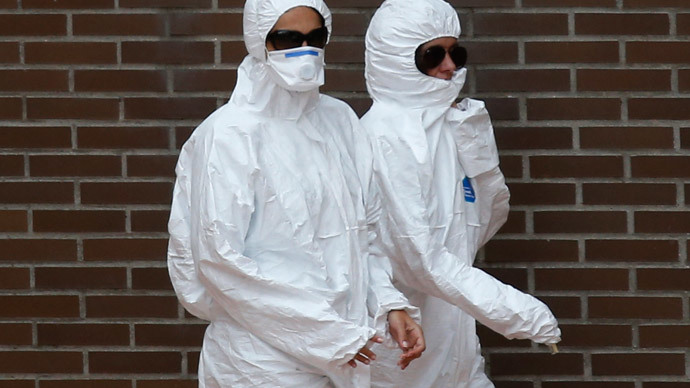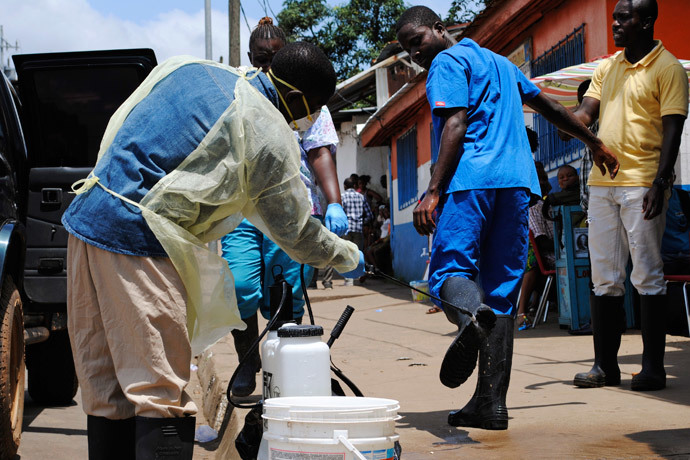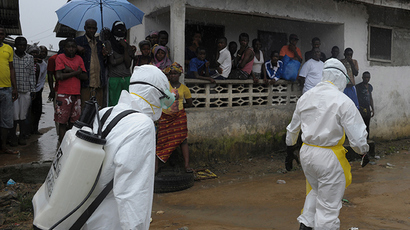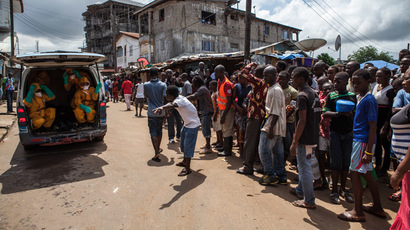More UK troops to tackle Ebola in Sierra Leone

Around 150 army medics will arrive in Freetown, Sierra Leone, on Tuesday evening as part of the UK’s aid effort to tackle Ebola. The soldiers will join a further 90 British medics and 300 soldiers already combating the virus.
The troops will run the Ebola Training Academy, teaching local healthcare workers how to prevent the spread of the disease.
The epidemic, which has left 4,500 dead, has infected more than double that number in West Africa.
Sierra Leone, Liberia and Guinea have been worst affected, with over 90 cases per 100,000 people in some areas. The World Health Organization (WHO) announced that Nigeria, however, is now free of the virus, having had no new cases in six weeks.
The troops, from the Catterick-based 35 Squadron, 5 Armoured Medical Regiment and the Royal Army Medical Corps, will be joined by International Development Secretary Justine Greening, who is traveling to Sierra Leone to observe the impacts of Britain’s £125million aid package.
Greening said “halting the disease in West Africa is the most effective way of preventing Ebola infecting people here in the UK.”
The extra medical support will also include “700 treatment beds in Sierra Leone, sending vital supplies such as chlorine and protective clothing, and training hundreds of health workers,” added Greening. She further said she was “looking forward” to seeing the effects of the UK’s involvement.

The troops are part of a package which involves 750 military personnel in total and includes the Royal Navy’s casualty ship RFA Argus.
This latest part of the UK’s package to fight Ebola comes as Foreign Secretary Philip Hammond welcomed the announcement from the Foreign Affairs Council in Luxembourg that further measures must be taken to control the spread of Ebola.
The Foreign Secretary said “we all need to do more to support the fight against Ebola and I’m pleased that EU Foreign Ministers explicitly recognized that necessity.”
He further said he was “delighted” to have the support of the EU in coordinating efforts to combat the virus. He said “this agreement will give international health workers responding to the Ebola crisis the assurances they need that they will receive the very best care possible, should they contract Ebola.”
At EU Foreign Ministers meeting. EU member states must do more, and more coherently, to tackle the #Ebola crisis. #FAC#EndEbola
— Philip Hammond (@PHammondMP) October 20, 2014
European countries have pledged £400million to fight the disease, but the UK believes it should be twice that amount.
The EU’s commitment to halting the spread of the disease comes as President of Ghana John Mahama announced on Tuesday that vital supplies were finally making their way to the worst affected areas.
Mahama, who has convened a meeting of the committee ECOWAS in November to address the problem, said more protective clothing and more transport was finally reaching the countries.
He also warned that aid efforts should be well coordinated. He said “there’s no need for us to duplicate each other … It must be a balance of things, closing all the gaps that exist and make sure that optimally the resources are going towards containing the disease.”
In addition to its overseas input, the UK will begin screening for Ebola at Gatwick on October 22, which will take place for those arriving from Africa. Screening will also be available at Manchester and Birmingham.














